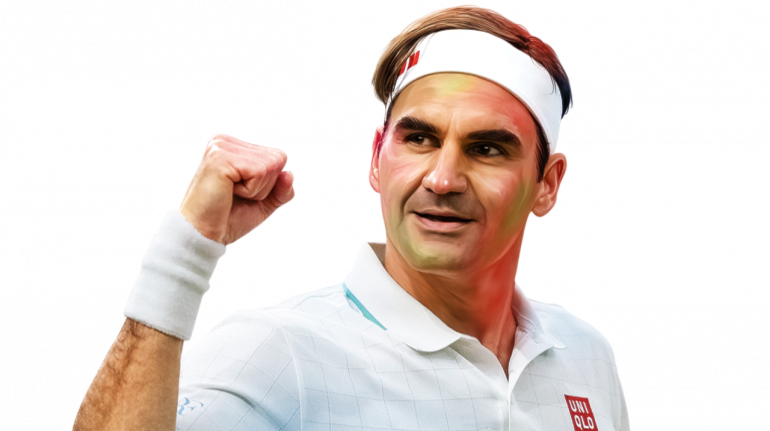



Note to readers:Healing Space is a weekly series that helps you dive into your mental health and take charge of your wellbeing through practical DIY self-care methods.
Roger Federer, dubbed “the one-man aristocracy of modern tennis”, has been likened to Apollo, the sun god who ruled athletic young men, with Rafael Nadal cast as Dionysus. David Foster Wallace wrote an entire essay-length production originally titled Roger Federer as Religious Experience, later renamed to something more mundane but palatable. And William Skidelsky’s Federer and Me: A story of Obsession wrote the book on the many forms this captivation takes in a man’s life. There is no need for further attestation to the fact that Federer is a god-like figure to modern tennis fans, it is however interesting to understand why.
 While many claim to be drawn to Federer for the sheer skill of his game, there is clearly more to it. The desirability of the athlete comes from our attributing to them the label of the superior human. The Olympics after all derive from Mount Olympia, the abode of the Greek god Zeus, where the best among men competed to be deemed champions and to be crowned by Nike, the messenger of the gods. Winners were crowned with laurel wreathes and then immortalised in statues depicting their anatomical excellence. The winning streak, and men who are capable of them, which also meant victory in war, with the looks, smiles, grace, presence, continue to carry our almost primal worship and become idols across cultures. This is why men like Federer become desirable not just to women, but to men who want to emulate him.
While many claim to be drawn to Federer for the sheer skill of his game, there is clearly more to it. The desirability of the athlete comes from our attributing to them the label of the superior human. The Olympics after all derive from Mount Olympia, the abode of the Greek god Zeus, where the best among men competed to be deemed champions and to be crowned by Nike, the messenger of the gods. Winners were crowned with laurel wreathes and then immortalised in statues depicting their anatomical excellence. The winning streak, and men who are capable of them, which also meant victory in war, with the looks, smiles, grace, presence, continue to carry our almost primal worship and become idols across cultures. This is why men like Federer become desirable not just to women, but to men who want to emulate him.
Federer’s game is mental as much as physical. Much of it is attributed to the polish lent him by his early coach Peter Carter, whose loss he mourned publicly, a state of grace that is as much about self-awareness and control that translates into his ground strokes and serve, later on reinforced by Peter Lundgren. Anecdotally, it was hard won. There are many superior athletes, but with Federer, you’re a fan of his composure as much as of his swing, because you are aware of what he’s not allowing it to devolve into. Part of the loyalty of the fanbase is in travelling the journey with him, from his early struggles to overcoming himself, to overcoming opponents, until finally his skill became so finely honed, it was a question of overcoming micro factors of circumstance and context, like rain setting off a 7-hour excruciating 2008 French Open.
This arc of the hero’s journey, the something to overcome, be it his temper, his depression, his grief, his frustration, his diet, stamina, injuries, and control over the process, makes him a relatable protagonist. The humanness of his struggle and the repeated triumphing over it, holding that ground for 237 weeks unbeaten, is what holds the projections of fandom. Had he been more god-like, his wins more effortless, the struggle less visible, he would have felt less deserving of them. He is like a Swiss watch, the cogs bare in their quest for elemental perfection. You can see him ticking, and that’s an emotional transparency that inspires trust because it feels authentic, worked at, efficient, and without artifice. It is a surrender in vulnerability and the fan is called upon to protect it.
All the Fedal feelings.#LaverCuppic.twitter.com/WKjhcADFoe— Laver Cup (@LaverCup) September 24, 2022
And yet, Federer can seem effortless where he needs to be, in stroke and strategy, in composure and volleying. Walt Whitman wrote in Song of Myself: Do I contradict myself?/ Very well, then I contradict myself,/(I am large, I contain multitudes.)… When we encounter incongruence, we rush to smooth it over.
Think of it like this, you may adopt a cat and give it a lot of love, knowing its lifespan is shorter than your own, thus guaranteeing you a period of grieving. And yet, after it passes you may adopt another. You may be a feminist, but you may enjoy a romantic comedy film that offers you the male gaze. These contradictions in our psyche, Freud explained, are what fragment the ego. In the splitting of the ego we recognise ourselves as both separate from and akin to. This is the source of cognitive dissonance, i.e. how we recognise inconsistency in our knowledge. We also seek out the reconciling of these contradictions throughout our lives, and in an icon like Federer, or any athlete who is able to work at reconciling discrepancies with visible effort, these contradictions are held together very well. Thus, he becomes the point of resolution, that in which the projected contradictions are safe. He shows us what may be reconciled within ourselves. That he achieves it, and makes it work, shows us that someday, we may too.
An icon is rarely a sum of wins, or a quantification of effort. Outright victory is often unbelievable to most people, which is why we universally think of billionaires as corrupt or evil in some way, worthy of envy and scorn, even if we have no evidence for it. We believe in the worthiness of sportspersons because they triumph through a pain we have already felt. Because they fear the failures we do. Because they take risks we don’t. And because they are the meeting point of our belief and disbelief. And so they amplify ourselves. Roger Federer is an us we will never be.
Discover the latest Business News, Sensex, and Nifty updates. Obtain Personal Finance insights, tax queries, and expert opinions on Moneycontrol or download the Moneycontrol App to stay updated!
Find the best of Al News in one place, specially curated for you every weekend.
Stay on top of the latest tech trends and biggest startup news.